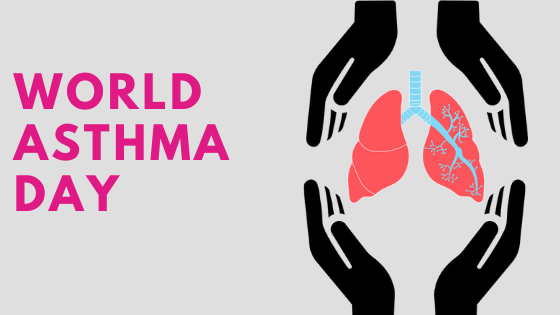World Asthma Day : Nutrition Can Help

2024-02-26 08:24:34
World Asthma Day : Nutrition Can Help
Today is World Asthma Day and it comes amid a global health emergency this year. Since # COVID19
is a disease that affects the lungs and airways,
it is more important than ever for individuals to be cautious.
Introduction to Asthma-
Asthma is a condition in which your airways narrow and swell and produce extra mucus. This can make breathing difficult and trigger coughing, wheezing and shortness of breath. It is characterized by variable and recurring symptoms, airflow obstruction, bronchial hyperresponsiveness, and an underlying inflammation.
Differentiation between genders ./ age groups:
Many phenotypes of asthma exist, ranging from mild asthma with onset during childhood to severe asthma with later onset, making asthma a broad disease with different pathologies. It may not be the same in different affected individuals. A gender disparity exists in asthma prevalence. As adults, women have an increased asthma prevalence compared to men. Further, women are more likely to have severe asthma and a later onset of asthma compared to men.
As children, boys have an increased prevalence of asthma compared to girls (11.9% vs. 7.5%, respectively), and boys are also twice as likely as girls to be hospitalized for an asthma exacerbation.
Women with more severe phenotypes of asthma are more likely to have asthma worsening during pregnancy.
Factors responsible for development of asthma:
Genetic
1> More than 100 genes are associated with Asthma across 18 regions, especially gene ORMDL3.
2> Gender – As mentioned in the previous paragraph.
3> Age – Children and old age are more likely to witness asthma due to a lower immunity.
Environmental factors
1> Toxins – Infections and exposure to endotoxins may be protective or may act as risk factors, depending in part on the timing of exposure in infancy and childhood / adulthood. Also, a higher pollution leads to exposure to toxins.
2> Maternal smoking – Associated with childhood wheezing, decreased airway calibre in child and increased risk of allergy. The child also has low immunity.
3> Diet and nutrition- Lower intake of omega-3, Vitamin E, D and Zinc are associated with higher rates of eczema and wheezing. Hence diet should be composed of fish oil, eggs, cereals, milk, probiotics – One should consult a nutritionist for keeping themselves immuned.
4> Stress – Stress is regulated by hypothalamic–pituitary–adrenal axis which decreases ‘cortisol’ responsible for allergic reactions. Higher stress levels might lead to a higher vulnerability to infections.
5> Excessive use of Antibiotics (Especially one with existing medical conditions) – This disrupts the intestinal lining and affects the gut bacteria, thereby lowering immunity. People with existing medical conditions henceforth need to be extra careful and consume adequate amounts of nutrients as per their blood reports and current conditions to keep themselves safe.
Asthma and a Higher risk of Coronavirus:
As per WHO, people of all ages can be infected by the new coronavirus (2019-nCoV). Older people, and people with pre-existing medical conditions (such as asthma, diabetes, heart disease) appear to be more vulnerable to becoming severely ill with the virus. This is because the lung capacity in such individuals are lower; and the COVID has been researched to attack the immune system and further weaken the respiratory tract. It can further result in pneumonia and severe illness.
Tackling Asthma and Reducing risk of Coronavirus:
1> Avoid Asthma triggers– Limit exposure to toxins, smoking, excessive antibiotics, self-prescribed drugs and focus on building immunity.
2> Diet and Nutrition – Ensure uptake of the Key Vitamins and Superfoods to lower the exposure in your case. It can be done by the following:
A> Increased flavonoids, antioxidants, plant sterols, fiber, and omega-3 fatty acids from fruits and vegetables have all been shown to reduce the risk of asthma as well as improve symptoms in those with asthma. A vegan diet has been suggested to reduce the symptoms of asthma and has been shown to reduce the need for medication.
B> Increased intake of omega-3 fatty acids has been clearly demonstrated to lead to anti- inflammatory eicosanoids (prostaglandins, leukotrienes, thromboxanes) thereby leading to overall improvements in asthma.
C> Pyridoxine may have direct benefits in asthmatics. These patients have been shown to have consistently lower plasma levels of pyridoxine phosphate levels when compared to normals.
D> The intake of vitamins C, E beta-carotene, as well as the minerals zinc, selenium and copper have all declined in the past 30 years due to drastic alterations in diet. Increasing antioxidant-rich foods is beneficial in asthma patients.
E> Magnesium has been well-established as a muscle relaxer. This is true regarding the smooth muscle of the bronchioles as well.
F> Vitamin D is known to block the formation of a variety of inflammatory mediators in the lung.
Superfoods List:
1> Amla
2> Apple
3> Carrot
4> Eggs
5> Fish Oil
6> Garlic
7> Green Leafy Vegetables
8> Ginger
9> Milk
10> Oranges
11> Pumpkin seeds
12> Spinach
By Dt. Prapti Ruia.
Sources:
https://www.ncbi.nlm.nih.gov/pmc/articles/PMC5629917/
https://www.ncbi.nlm.nih.gov/pmc/articles/PMC2764772/
https://www.who.int/emergencies/diseases/novel-coronavirus-2019/advice-for-public/myth-busters#:~:text=People%20of%20all%20ages%20can,and%20good%20respiratory%20hygiene.
https://www.researchgate.net/publication/318769104_Nutritional_Protocol_for_Asthma




